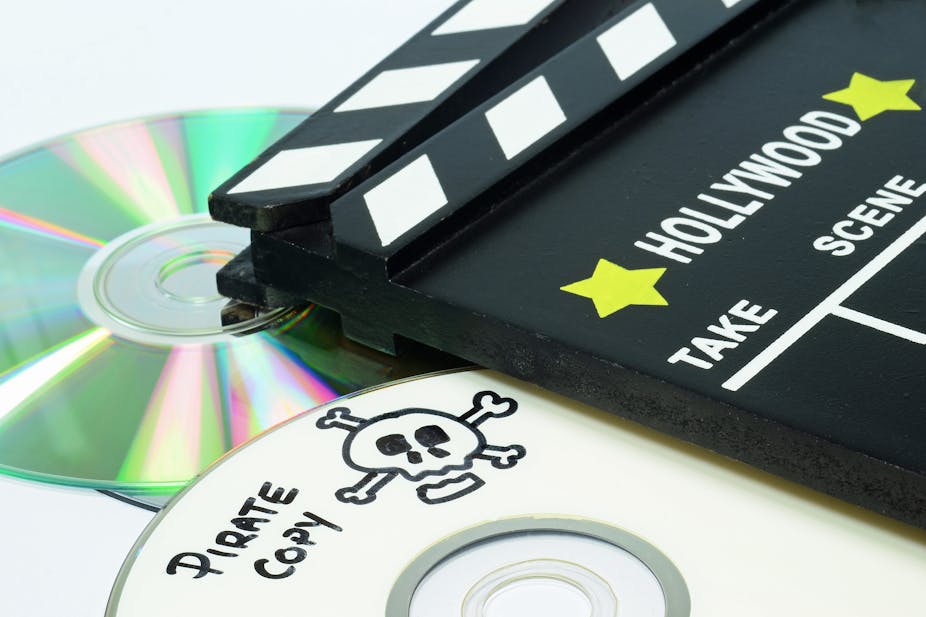In December 2015, the FBI traced the leak of Quentin Tarantino’s “The Hateful Eight” back to a Hollywood executive. According to The Hollywood Reporter, watermarks on the leaked copy led to the office of Andrew Kosove, co-CEO of Alcon Entertainment.
This was no isolated incident.
Pirated copies of all feature films nominated for this year’s Oscars are online. Many are in high resolution, often sourced from “screeners” – copies sent out to reviewers or award judges. Observers found a 385 percent surge in piracy worldwide after films are nominated for an Oscar. In seven out of the past 14 years, 95 percent or more of Oscar-nominated movies leaked online.
With leaks rampant during awards season, it is worth exploring how films are pirated, and whether illegally downloaded films may serve as free advertising for studios and distributors.
Piracy tracking firm Irdeto estimates that “Hollywood screeners accounted for 31 percent of the illegal downloads tracked” in 2015. Six movies nominated for 2015 awards were circulated online before becoming available for retail purchase: “American Sniper,” “The Imitation Game,” “Wild,” “Selma,” “Whiplash” and “Still Alice.”
So-called “release groups” will distribute popular films online. For example, in late 2015, the release group Hive-CM8 made headlines when it posted “Spectre,” “Legend,” “In The Heart of The Sea,” “Joy,” “Steve Jobs,” “Spotlight,” “Creed,” “Concussion,” “The Danish Girl” and “Bridge of Spies.” Over the holidays, other groups leaked “The Revenant,” “Straight Outta Compton,” “Brooklyn,” “Room” and “The Peanuts Movie.”
These groups may offer peer-to-peer downloads or streaming, funded by ads or subscriptions. Leaked films will often first appear on invitation-only sites before spreading to public venues like The Pirate Bay and KickassTorrents, where anyone can access them.
For the 2015 Oscars, voting members of the Academy of Motion Picture Arts and Sciences received 68 screeners (59 DVDs, 9 Blu-Rays). Twelve of them reportedly leaked, another 10 nominated films were distributed as “cam” copies, and only two weren’t leaked (“Song of the Sea” and “Glen Campbell: I’ll be Me”). Four even leaked before they opened in theaters: “Still Alice,” “Mr. Turner,” “Two Days, One Night” and “Captain America: Winter Soldier.”
The year 2016 has been more of the same. Half of all Oscar-nominated movies leaked from screeners well before Oscar night, and nine were online before opening in theaters. “Star Wars: The Force Awakens” is the lone 2016 Oscar nominee leaked only as camcorder recording.
To combat piracy, screeners usually have forensic watermarks: an invisible stamp in every frame. Industry lawyers send out demands that leaked films be taken off infringing websites and omitted from Internet search results.
Still, Hollywood seems somewhat complicit in the practice.
Twelve years ago, a videocassette of “Something’s Gotta Give” intended for Oscar voters leaked. It had been sent to Academy member Carmine Caridi, an actor who appeared in “The Godfather: Part II” and who played Vince Gotelli on “NYPD Blue.”
The incident prompted the major studios to announce they would stop sending out movies to juries and reviewers. But the experiment was short-lived. In an effort to maintain good relations with critics and awards voters, within a few months the industry returned to distributing screeners.
The industry wants to control distribution, but too often, their penchant for promotion enables piracy. While leaks can be from manufacturing plants, distribution chains or just a camcorder smuggled into a theater (though poorer quality makes these copies less desirable), the most reliable source continues to be the Hollywood PR machine itself. And aside from review copies or award show screeners, an increasing shift to online distribution means an increasing supply of possible sources for piracy.
Furthermore, a movie leak does not necessarily impact the bottom line.
In 2011, director J.J. Abrams was interviewed on the Howard Stern show to promote “Super 8.” Soon afterwards, the film leaked online with the “H Stern” watermark. As Deadline Hollywood notes, the US$50 million production nonetheless grossed $185 million worldwide. “The Hobbit: The Battle of the Five Armies” was downloaded over 500,000 times in the first 24 hours of being leaked (with watermarks painstakingly removed); yet it grossed over $956 million worldwide, making it the second highest-grossing film of 2014 and the 30th highest-grossing film of all time.
Despite all the leaks, Hollywood earned $38 billion globally at the box office in 2015, and a record $11 billion-plus in the U.S. Five 2015 releases grossed over $1 billion, three earned over $1.5 billion, and four were among the top 10 highest-grossing films of all time.
In fact, leaks may act as a source of publicity. Hive-CM8, after leaking “The Hateful Eight,” argued that a leak predating a theatrical opening generates free PR that might increase the theatrical audience – and that people who downloaded it would also be eager to see it in the quality Tarantino envisioned (in Ultra Panavision 70mm).
No doubt the costly marketing, advertising and promotion campaigns for big-budget films are far more sophisticated than a simple leak that generates attention. Nonetheless, considering the crucial role PR screeners play in promoting films, the industry might see piracy as a cost of doing business, if neither the number of movies made nor their profits are dented by piracy.

